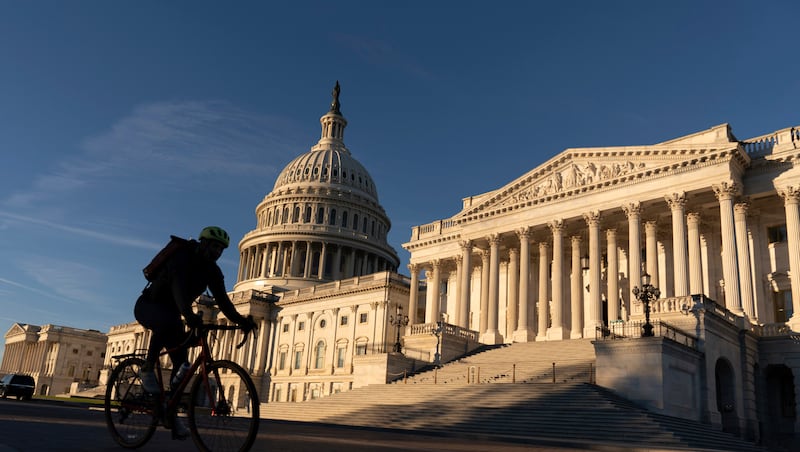
An earlier version of this article was first published in the On the Trail 2024 newsletter. Sign up to receive the newsletter in your inbox on Friday mornings here.
Happy Friday, friends. It’s swearing-in day in Washington for the 119th Congress. That includes John Curtis, the freshman senator from Utah who will replace Mitt Romney. Read my story on Curtis here.
The big idea
Faith in the Capitol
As a growing share of U.S. adults turns away from religion, Christianity is still thriving in one American institution: the U.S. Congress.
Advertisement
Advertisement
Members of the 119th Congress overwhelmingly identify as religious, and though the share of Christian members of Congress has dropped slightly in recent years, Christians are still overrepresented in the Capitol.
According to data compiled by CQ Roll Call and organized by Pew Research Center, 461 members of the incoming Senate and House of Representatives — or 87% — identify as Christian.
That’s down from 88% two years ago and 92% a decade ago, but it is far ahead of the 62% of U.S. adults who identify as Christian, per Pew’s polling.
In one way, the incoming Congress will be record-breaking: for the first time, multiple members describe themselves as religiously unaffiliated, or “none.” Kyrsten Sinema, the outgoing independent senator from Arizona, made history when she became the first U.S. congressperson to ever describe her religion as “none”; in the incoming Congress, three will do the same: Rep. Yassamin Ansari, D-Arizona; Rep. Emily Randall, D-Washington; and Rep. Abraham Hamadeh, R-Arizona.
Advertisement
Advertisement
In recent decades, the share of U.S. adults who identify as “nones” has increased dramatically. Still, the share of “nones” in Congress — making up less than 1% of the body — far trails the 28% of U.S. adults who have no religious affiliation.
That disparity between the country’s religious makeup and Congress’ is not surprising, said Ryan Burge, a professor of political science at Eastern Illinois University. “Congress represents America as it looked 20 or 30 years ago, not the way it looks today,” Burge told CQ Roll Call.
Among congressional Democrats, the shift toward a religious makeup that more closely represents the country appears to be occurring more rapidly. A majority of Democrats — 75% — identify as Christian, and the remaining quarter include a diverse array including Jews, Buddhists, Muslims, Hindus, Unitarian Universalists and a humanist. Meanwhile, a vast majority of Republicans — 98% — identify as Christian.
My fellow Latter-day Saints make up a shrinking share of Congress. In the 114th Congress (2015-17), there were 16 Latter-day Saints in Congress; now, there are nine. All are Republicans.
Advertisement
Advertisement
More in Politics
Curious for more? Find the full data here from Pew Research Center.
A New Year’s news quiz
For the most loyal “On the Trail 2024″ readers — take a crack at this 12-question quiz. It touches on the wild, unpredictable year of politics that was 2024. The correct answers will be sent out in next week’s newsletter.
Think you have what it takes? Send your answers to onthetrail@deseretnews.com. The first reader to get them right will win a Deseret News tumbler.
Here we go:
-
According to a Deseret News/HarrisX poll we published in January, what percentage of Republican voters thought Trump was a “person of faith”?
-
Which candidate won the Nevada GOP presidential primary?
-
Who was Trump’s final Republican challenger to bow out of the presidential primary?
-
The nonprofit group No Labels attempted to draft a candidate to run atop its presidential ticket. All of their options said no. Which of the following Utahns was among them?
-
Which Hall-of-Fame basketball player endorsed Robert F. Kennedy Jr. for president?
-
Which of the following events was scheduled to take place in Utah before being canceled?
-
What was Utah Gov. Spencer Cox’s stated reason for endorsing Trump?
-
What was Pres. Biden’s stated reason for exiting the presidential race?
-
Which campaign first created a formal Latter-day Saint voter outreach initiative?
-
What billionaire megadonor appeared onstage with Trump during his October return to Butler, Pennsylvania?
-
In the September debate, Trump said he had “concepts of a plan” for which policy area?
-
Who said the following quote shortly after the presidential election was decided? “We accept the choice the country made. I’ve said many times: you can’t love your country only when you win.”
3 things to know
-
Speaker shuffle: When the House of Representatives convenes this morning, its first task will be to elect its speaker. House Speaker Mike Johnson earned a big endorsement from Donald Trump, after his negotiations to avoid a government shutdown the week before Christmas drew ire from MAGA world. Johnson should have the votes to avoid a McCarthy-esque drama — but nothing is guaranteed. Read more here.
-
Carter’s legacy: Former President Jimmy Carter passed away Sunday, leaving behind a legacy as a philanthropist and humanitarian. But one aspect of his legacy is being called into question by the president-elect: his decision to hand over control of the Panama Canal. Read more here.
-
Legal woes: Trump’s efforts to overturn the verdict in his sexual assault case were stymied Monday, after a federal appeals court upheld the May 2023 verdict and ordered Trump to pay $5 million in damages. Read more here.
EMEA Tribune is not involved in this news article, it is taken from our partners and or from the News Agencies. Copyright and Credit go to the News Agencies, email news@emeatribune.com Follow our WhatsApp verified Channel




